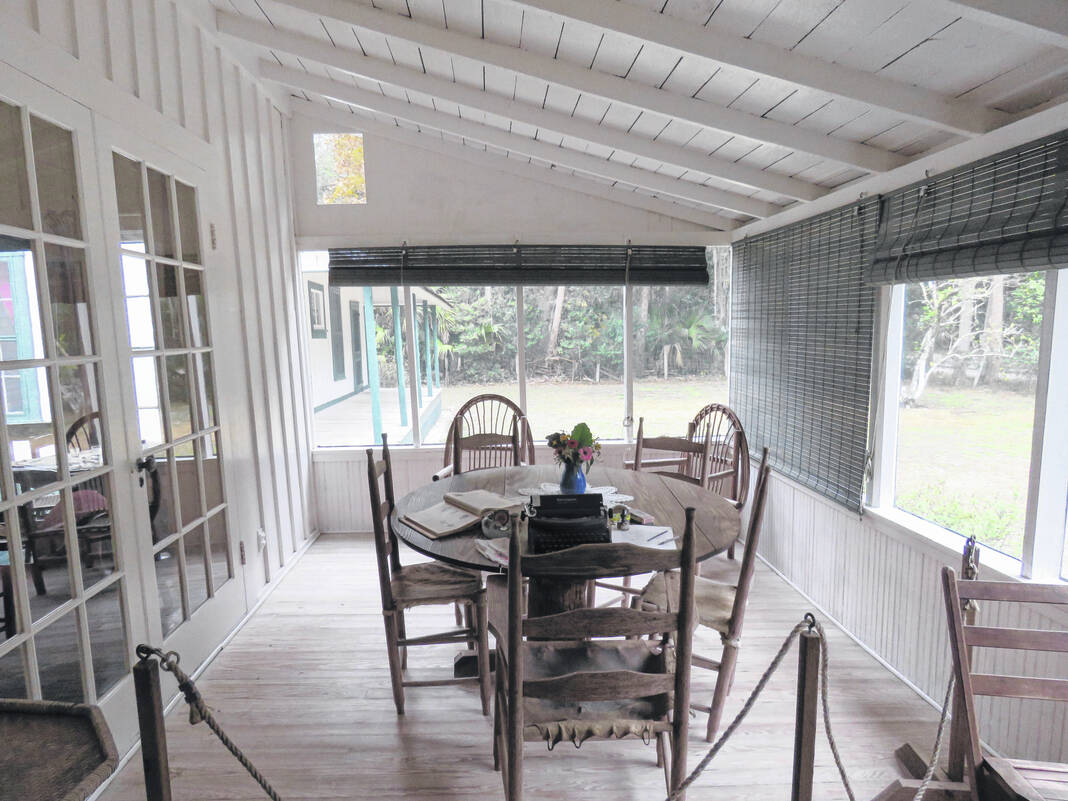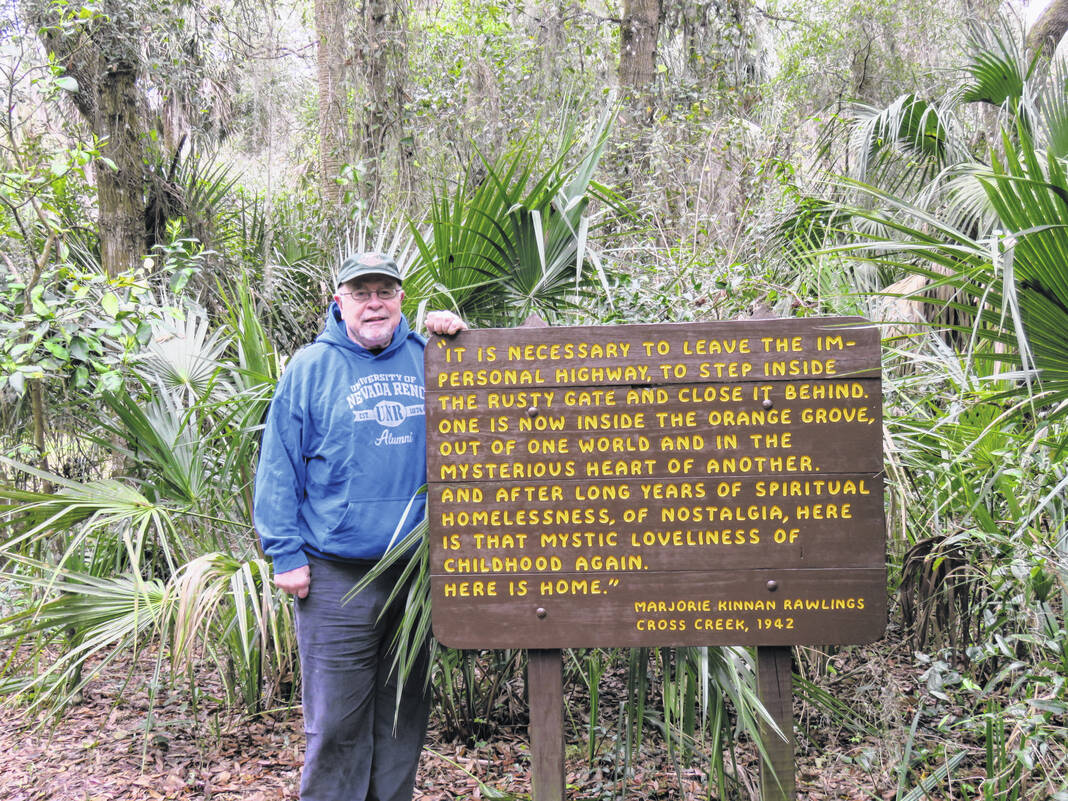

The entrance porch to the Rawlings house holds the author’s black typewriter.
Photo by Gosia Nuwer

A sign next to our columnist marks the entrance to a wooded path on the property.
Photo by Gosia Nuwer
Near Darke
By Hank Nuwer
“You sure put on a poopy face when something doesn’t go your way,” my wife Gosia said to me. I walked with dejection beside her as we headed toward the parking lot of the Marjorie Kinnan Rawlings Historic State Park in Cross Creek, Fla.
“It’s not a poopy face,” I pouted. “It’s a `just disappointed’ face.”
“No, it’s a poopy face,” she assured me.
Here’s the backstory for my Mr. Yuk downturned mouth.
I had compromised when Gosia pleaded to take a short vacation from Union City to Florida.
I’m the grouch who wants nothing to do with sand, sunburn, Jimmy Buffet music and souvenir shops. I despise all the Florida things that make Gosia put on a smiley face.
But I said I’d come if I could visit the Cross Creek estate of the Pulitzer Prize-winning author of “The Yearling” and “Cross Creek,” two of my favorite novels about Florida’s pioneer subculture.
So here we were on a Monday. The only people in sight were volunteers doing cleanup of the property, feeding the chickens, and picking up oranges from the orange groves Rawlings planted during the Depression.
That’s when a volunteer informed us the grounds were open all week, but Marjorie’s 1930s farmhouse was only open for guided tours Thursday through Sunday, October to July. The “Florida State Parks” page failed to announce that distinction.
And so, we’d driven for hours from our Sarasota lodging, only to see my dream evaporate about visiting my literary heroine’s home.
“Wait, wait,” called a voice.
One of the volunteers offered to unlock the house and give us a tour.
I ogled the shady covered porches. I marveled to see the black Royal typewriter that had spawned the stories that so entranced me.
“I do not understand how anyone can live without some small place of enchantment to turn to,” Rawlings once wrote.
She had made it a house of enchantment. Every window had a view of the orange trees and thick vegetation with its flitting redbirds. Near the house was bubbling Cross Creek, and a man in hip boots gracefully cast his fly line.
Our guide, Susan, was a perfect raconteur. She peppered her tour’s lecture with facts and details like the spots on a brook trout.
She told us how Rawlings wrote like she had an angel on her shoulder, but lived like the devil drove her.
Marjorie drank too much and cracked up her cars, said Susan. She — Marjorie, not our guide — cussed like a muleskinner.
Reynolds used a racial epithet even though she loved her brilliant black writer friend, Zora Neale Hurston.
She married a newsman first, but he didn’t share her love of Florida and departed. “He probably hated sand, sunburn, Jimmy Buffet music and souvenir shops,” I quipped to Gosia.
“You’re dead,” said Gosia with a razor-thin smile.
Rawlings pushed a local hotel proprietor named Norton Baskin to wed her. Her drunken rages pushed him and a black maid away.
The one soul to stick with her was Scribner’s editorial genius Maxwell Perkins. He found her letters to him charming, said Susan.
The writer cleared the scrub brush and turned the farm into a profitable orange-growing enterprise. She lighted fires to save more than one crop in a freeze.
She loved her colorful neighbors but once shot a farmer’s pig that trespassed. Her life came unglued when she used the real name of a neighbor in her fiction, and the woman sued her.
Susan told us stories about the house guests who now lined the walls as photos in frames. There was Gregory Peck, star of the movie version of “The Yearling.” Rawlings put him up in the guest room’s hand-carved bed.
She was an excellent cook, said Susan, as she showed us the lovely kitchen.
A couple more volunteers came by. One woman held a new copy of “Cross Creek Cookery” by Rawlings. The book is on our kitchen shelf with recipes for cooter (turtle) soup, Hoe Cake, oven cornbread, fried cheese grits, and swamp cabbage.
Y’all want to stop by our place for lunch and seconds?
The tour ended at a sharecropper’s cabin on the property. Our guide bade us farewell.
We ended the visit by hiking lovely paths on the property.
Gosia and I signed the guest book at the exit. We gave this historical home tour a five-star rating.
As we left, I told Gosia a Rawlings quote I memorized. “A woman has got to love a bad man once or twice in her life — to be thankful for a good one,” I said, chuckling.
“Are you the bad man or the good one?” Gosia asked. “Oops, you’re putting on a poopy face again, Dear.”
Hank Nuwer is an author, columnist and playwright. He and wife Gosia live on the Indiana side of the Union City state line. Viewpoints expressed in the article are the work of the author. The Daily Advocate does not endorse these viewpoints or the independent activities of the author.




